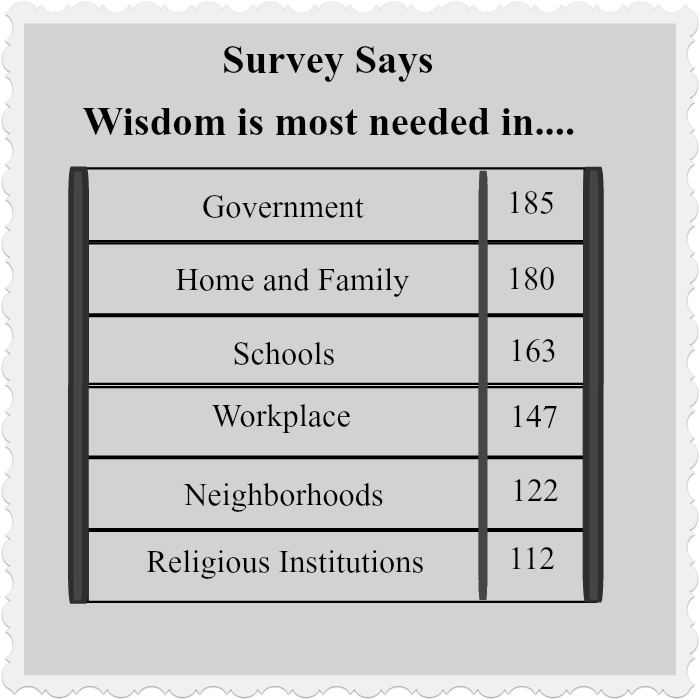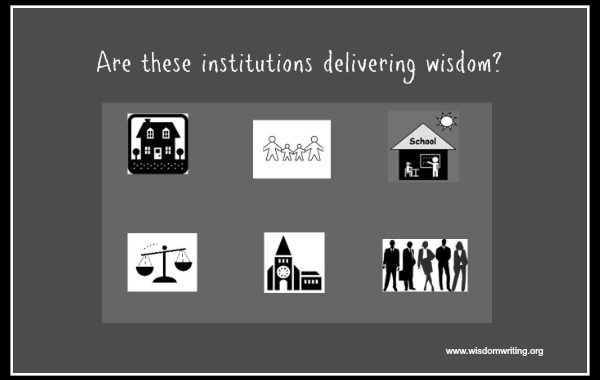“Where is wisdom not needed?” said a quarter of my Gen X respondents before selecting among six categories to indicate where wisdom is needed most today. Many of the 212 individuals age 36-55 who participated in my wisdom survey, also expressed their concerns about where wisdom is lacking as they shared their insights. Their responses are summarized below the survey results, in order of highest to lowest preference.

Note: The answers of 18-35 year olds were almost identical to above- with the exception of the younger group ranking Schools higher than Home and Family.
Government
“Our current political environment is hardening people…..and acting for the collective good is in jeopardy,” said one respondent. “We are not being governed by wise leadership” and the “current divisive reality of US politics is heartbreaking,” said two others. Some merely said, “Just turn on the news, isn’t it obvious?” when referring to the lack of wisdom in government. The level of frustration expressed by Gen X was a little deeper than that shared by the younger generation who simply want leaders “to actually lead,” and maybe haven’t lost their faith that someone with wisdom will fulfill this role. “Government needs to begin looking beyond short term results to see the long view that wisdom requires.”
Home and Family
The family “as a building block of society” where “everything begins” was expressed almost as an antidote to the lack of wisdom in government. A positive home life held the promise of being a grassroots influence if it was led by parents with the ability to teach their young children to act in a conscientious manner as they modeled wisdom. This view was juxtaposed with the concern that family life could disintegrate if people are too distracted by cultural and social media influences rather than taking the time to have direct interactions and conversations about topics that matter. Regardless of whether respondents held a hopeful or fearful opinion of our family life, both agreed that families need a lot of support to function in our technological age.
Schools
Another view expressed was that families “are mostly set in their ways” so we need to look to educational institutions “to really help make positive changes on a larger scale.” However, this can be challenging when society doesn’t listen to teachers or provide the resources to develop mentors for our young people. Some are worried that too many kids are falling through the cracks and this will affect everyone’s future.
Workplace
We spend a lot of time at work, yet we don’t always see this as a place that needs wisdom, even though it is where many people “receive their identity.” According to one respondent, “The workplace, for many, is a means to an end: We do something we hope makes a difference and we bring home a paycheck.” A wise leader can have a huge impact on an organization, not just by making effective financial decisions but by building a sense of community and strong teams. This is a goal worth aspiring to; however, too many leaders are “simply concerned with the bottom line” and they miss the opportunity to empower their employees to develop and share wisdom.
Neighborhoods
“When we know our neighbors, we reduce the fear of the other. We help, we look out for one another and we are inspired to make changes.” While some of the respondents lamented that we don’t know our neighbors, many believe that “transformation will happen at the local level” as they advocated for action by “average citizens” or “ordinary humans.” They wanted to see neighborhoods begin to thrive because they were based on each person’s unique contribution and together we could begin to impact the problems we find in our communities.
Religious Institutions
To those who checked this box, there may have been an expectation that religious institutions should be a place of wisdom; however, several respondents clearly communicated that this could not be assumed. “Religion, in my opinion, is driven by ideology and beliefs – not wisdom.” “Religious institutions knowingly and even unwittingly create tension and disunity among communities, neighborhoods, families, individuals. True Wisdom would pay attention to this and guard against that ability they have to separate people.” Even though this was the last area checked in order of popularity, 53% of Gen X respondents still checked this box and appeared to be connected to religious institutions.
The insights expressed by my 36-55 year old respondents as they shared their concerns about where we need to cultivate wisdom today, reveal a group ready to take on the challenges we face in our world. Their previous answers to the questions in the wisdom survey had a similar message to those of the 18-35 year old respondents and piqued my curiosity about what I will learn from the next age group, the 56-75 year olds, infamously known as The Boomers.
To begin reading the Boomers wisdom series, click here
To start at the beginning of the Gen X series, click here
To read the Millennial series, click here
